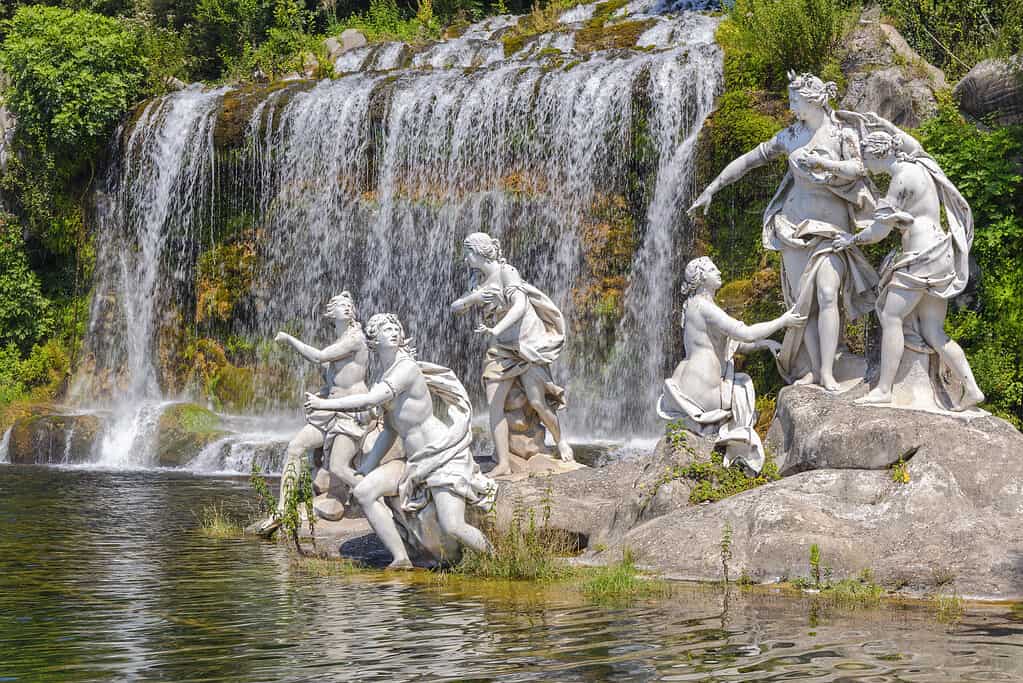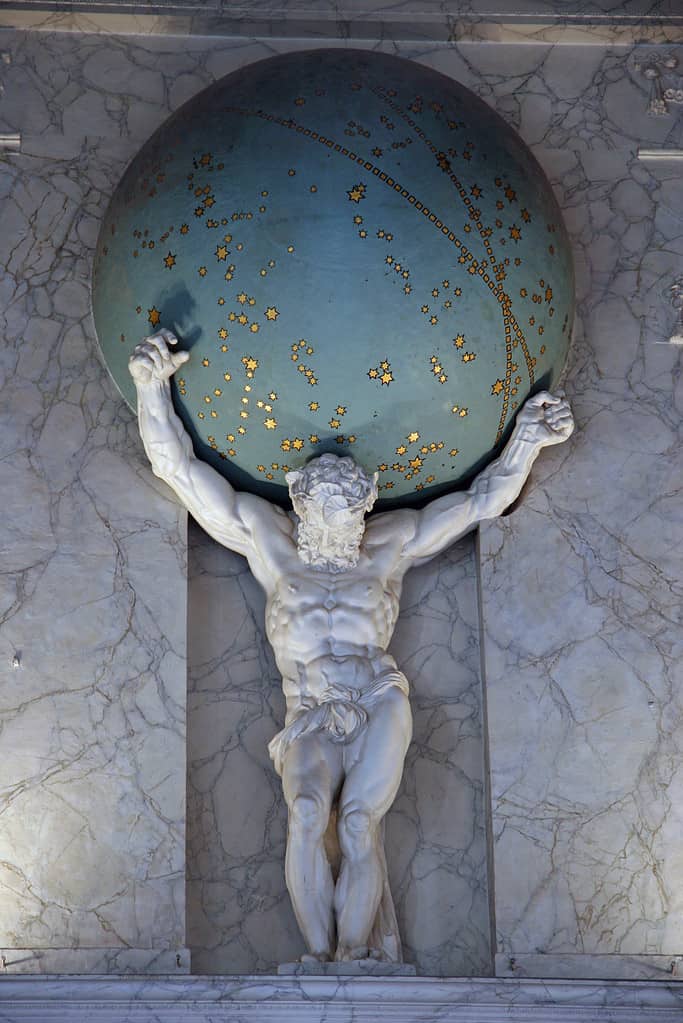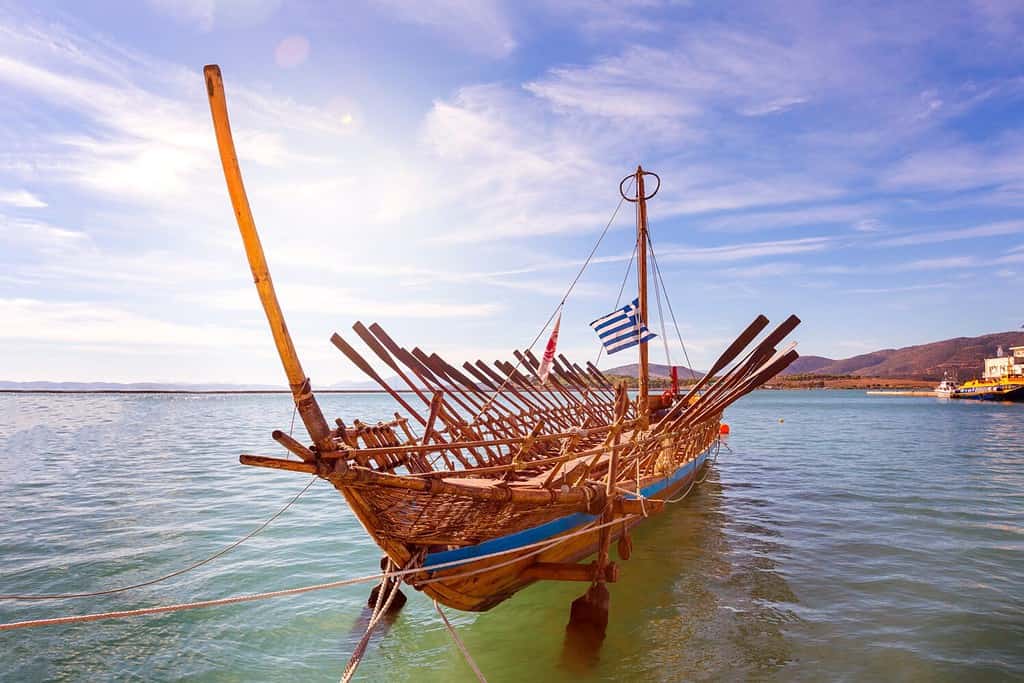A prominent figure in Greek mythology, Calypso is forever entwined with the epic journey of Odysseus, the Greek hero who triumphed over countless challenges as he fought to make his way back home after the Trojan War. However, Calypso extends far beyond a supporting role in Odysseus’ tale. She embodies many dimensions, symbolizing beauty and enchantment, but also representing the struggles faced by women, the captivating allure of nature and the sea, and the bittersweet essence of both love and loss. Dive in and discover Calypso, the legendary sea nymph who captured Odysseus!
Who is Calypso?

Nymphs are nature spirits that live in bodies of water, forests, mountains, and other natural locations.
©Morrison1977/iStock via Getty Images
In Greek mythology, Calypso is a minor nature goddess or sea nymph commonly associated with Homer’s Odyssey. Nature nymphs typically have an association with a particular location or landform, such as a river or mountain. Although they have various powers, nymphs are minor goddesses and primarily command the elements within their specific realm. Nymphs frequently live together in groups of sisters. They are renowned for their exquisite beauty and often become objects of admiration and desire.
Calypso, however, is quite distinct from other sea nymphs, disguising herself as a unique individual. She is fearless when it comes to expressing her opinions to Zeus, the king of the gods. Unlike other nymphs, Calypso lives in solitude without any sisters and very little is known of her family. Calypso’s dominion over the secluded island of Ogygia also sets her apart, as she remains its sole inhabitant.
Calypso’s island is associated with the dawn of time or something primeval, and its location remains a mystery to scholars even today. In addition, historians suggest that Calypso’s name is as enigmatic as her island, and it may mean “beautiful sight”, “hidden”, or “concealing the knowledge”.
What Does Calypso Look Like?

Calypso was a young deity with supernatural beauty.
©Kharchenko_irina7/iStock via Getty Images
As a sea nymph or minor nature goddess, Calypso exudes extraordinary beauty. In Homer’s Odyssey, she is referred to as a “maiden eternal” and “lustrous”. Her epithets include descriptions such as “the nymph with lovely braids”, the “seductive nymph”, the “queenly nymph”, and the “bright goddess”.
When Odysseus washes up on Ogygia, he finds Calypso weaving near a large hearth inside a large cave. He is mesmerized by her “breathtaking voice” and her beautiful home. Odysseus explains that “even a deathless god who came upon that place would gaze and wonder, heart entranced with pleasure”.
Homer also portrays Calypso as perceptive, intelligent, and unafraid to voice her opinions and thoughts. For example, when Zeus and Hermes chastise her for having an affair with Odysseus, she masterfully turns the tables and criticizes Zeus’ double-standard mindset.
Where Did Calypso Come From?

As punishment for fighting the gods, Atlas now holds up the heavens and sky.
©Simon Phipps/iStock via Getty Images
According to Homer, Calypso is the daughter of Atlas, the powerful titan who holds up the heavens and sky. Although he never mentions her mother, a few of the other ancient authors had their own theories. According to Hyginus, Calypso’s mother was Pleione, the mother of the Pleiades. However, Hesiod mentions that she is an Oceanid and the daughter of Tethys and Oceanus. On the other hand, Apollodorus writes that Calypso is a Nereid, the daughter of Nereus and Doris.
Calypso in the Myths and Legends of the Ancient Greeks

Odysseus was away from his home for 20 years.
©Nataliya Nazarova/Shutterstock.com
In the stories and legends of Greek mythology, Calypso plays a prominent role in Homer’s Odyssey. It takes Odysseus an additional 10 years to return home after the Trojan War due to his transgressions against Poseidon, the god of the sea.
During his journey home, Odysseus encounters a terrible storm and washes up on the island of Ogygia, which is where he finds the sea nymph Calypso. In Book V of the Odyssey, Homer explains that Calypso instantly fell in love with Odysseus as soon as she laid eyes on him. She helps to nurse him back to health and then promises to make him immortal if he stays with her.
Initially, Odysseus is relieved by the safety and respite from his troubling journey. Ultimately, however, he declines Calypso’s enticing offer, instead overwhelmed by his longing to return home to his wife, Penelope. Unfortunately for Odysseus, Calypso refuses to let him go, holding him captive on her island for seven years.
Athena, the goddess of wisdom, eventually intervenes and persuades Zeus to help Odysseus get back on his journey. Zeus sends Hermes, the messenger god, to visit Calypso and command her to release Odysseus from her island. Understandably displeased by this turn of events, Calypso criticizes Zeus and the other male gods as “unrivaled lords of jealousy”. She explains that it is not fair to reprimand female goddesses for having mortal lovers while male gods continually indulge in their own affairs with mortal women.
However, in the end, Calypso releases Odysseus, saying, “Now I am willing, heart and soul, to send you off at last”. She even gives him advice and provisions, sending him on his way with a warm and gentle wind to guide his ship.
What Happened to Calypso?

Calypso’s heart was broken when Odysseus left her.
©Serenko Natalia/Shutterstock.com
It is not entirely clear what happened to the sea nymph Calypso after Odysseus left her island. Some scholars believe she died of a broken heart, while others suggest she remained on her island but forever mourned her loss. In some accounts, Calypso gave birth to one or two of Odysseus’ children after he left her island. According to Apollodorus, for example, Calypso and Odysseus had a son named Latinus. However, according to Hesiod, they had two sons named Nausithous and Nausinous. In addition, the ancient fragment from the Catalogue of Women suggests that Calypso may have also borne children with Hermes after he visited her island. However, there is no consensus on what truly happened to the legendary sea nymph.
Meaning and Symbolism of Calypso in Greek Mythology

Calypso is a multidimensional character in Greek mythology.
©Kharchenko_irina7/iStock via Getty Images
Many modern portrayals depict Calypso as a seductive temptation for Odysseus to face and overcome. However, within Greek mythology, Calypso continues to be an immensely intricate character with much more depth.
Calypso is a bewitching nymph and certainly plays a pivotal role in showcasing Odysseus’ positive qualities in the Odyssey. She entices and tempts him with immortality and eternal companionship on her paradisiacal island, and yet Odysseus remains resolute and unwavering in his loyalty to his wife, Penelope.
However, Calypso herself also showcases several positive qualities as well. Although initially she entices and confines Odysseus on her island, she also releases him and refrains from causing him any harm. Instead, she displays unexpected grace and generosity towards him. Not only does she set him free, but she even aids him in his preparations for the arduous journey that lies ahead, prioritizing his happiness and well-being above her own desires.
In addition, Calypso transcends being merely a seductive challenge for Odysseus — she is an independent character in her own right. When commanded to release Odysseus and rebuked for her human lover, she fearlessly confronts Zeus, the king of the Gods and the most powerful Olympian. Calypso openly criticizes his unjust treatment of women and goddesses, questioning why male deities are allowed to engage in relationships with mortal women while goddesses face punishment and ridicule by shedding light on the hypocrisy of the Olympians. Calypso not only embodies physical beauty but also intellectual prowess, confronting male authority as she sheds a bit of light on societal inequalities.
Thank you for reading! Have some feedback for us? Contact the AZ Animals editorial team.








